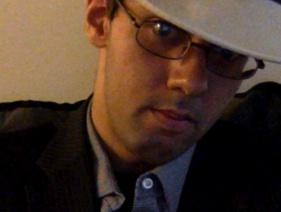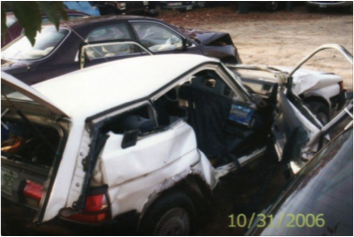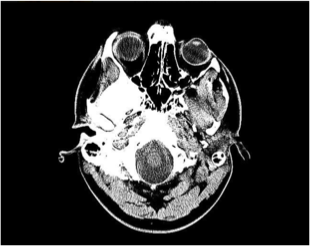Editor’s Note:
Recently, my inbox dinged with an employment inquiry from a copywriter named Jayme Severance. Local to my town, Jayme had been struggling to find consistent work. Unlike those of us who have experienced similar frustration, I’m confident none of us have had to overcome a fraction of what Jayme, a traumatic brain injury survivor, has in order to get in the game — nevermind, compete. Check out the following Q&A with Jayme… evidence of the talent behind his same-day hire.
First, a few words from Jayme, by way of introduction…
In order to tell you about who I am in relation to Waypoint Writing — education, years of experience, professional interests, blah, blah, blah — I have decided to arrange an introductory guest posting for this firm in the form of an interview — an informal Q&A.
I chose the Q&A style interview, with questions posed by Waypoint Writing Principal and Creative Director, Amanda Silva, as the frame to share this information; the circumstances surrounding my status as a copywriter with this firm is as broad as it is diverse. I have a story to tell.
My name is Jayme Severance, and I’m not your average copywriter…
 I have no outward appearance of being different from anybody else. I speak differently, but I am about as functional and capable if minor allowances are made.
I have no outward appearance of being different from anybody else. I speak differently, but I am about as functional and capable if minor allowances are made.
Amanda: What have you experienced, regarding struggles finding full-time employment as a copywriter?
Jayme: To truly answer that question, I must give you a brief background of what is collectively referred to as “my story.” On October 29th, 2006, I was involved in a near-fatal Motor Vehicle Collision (MVC) from which I sustained brain damage in the form of a Traumatic Brain Injury.
 There is a bittersweet irony that the box of paintballs in the passenger seat — where I was sitting — are called “Nightmare paintballs.”
There is a bittersweet irony that the box of paintballs in the passenger seat — where I was sitting — are called “Nightmare paintballs.”
The struggles I have experienced in finding full-time employment are myriad in nature. Due to the fact that I also have vocal fold paralysis as a consequence of a tracheostomy — a medical procedure in which an incision is made in the trachea (throat) to create a new airway to breathe — I assume prospective employers often make ill-informed judgments about my capabilities, as I don’t sound like everybody else.
That’s the big one.
Put it this way: I speak “normally,” but it is fairly obvious to even the casual observer that something has happened to me from the moment I open my mouth — nothing else would so identify me as being part of a population of people distinctly different from everyone else.
Another big one would be memory and executive functioning (the ability to make quick decisions), which tend to be particularly problematic in interviews, where one has to make quick decisions about what to say. One could rehearse beforehand, but the memory and executive functioning issues often work in tandem with each other, which employers don’t always understand. I try to mitigate this by being upfront about my conditions beforehand, but it is what it is.
 This is a CT image of my brain a year after the accident. The white areas are scar tissue; in other words, the better part of half my brain is dead. The fact that I am as functional as I am currently is nothing short of miraculous, as 90% of people who have my type of injury never regain consciousness, and the 10% that do live on do so with significant impairments. I’m one lucky guy in that respect.
This is a CT image of my brain a year after the accident. The white areas are scar tissue; in other words, the better part of half my brain is dead. The fact that I am as functional as I am currently is nothing short of miraculous, as 90% of people who have my type of injury never regain consciousness, and the 10% that do live on do so with significant impairments. I’m one lucky guy in that respect.
The last notable struggle I grapple with would be lack of experience as a copywriter. Due to the fact I haven’t been employed full-time or part-time since my 2014 graduation from college to now — taking volunteer work and internships — there is a serious dearth of work experience on my résumé. A recent article, The big obstacle on his road back from brain injury: Getting hired, published by the Union Leader details these struggles.
(Sorry about the long-winded answer. My bad.)
Amanda: What do you attribute to your incredible ability to have overcome so much in, arguably, a short amount of time?
Jayme: In short? Boredom. I know what a disappointing answer that must be to hear, but that doesn’t make it any less true. As I have pointed out in an interview, I’m not sure which one exactly, I would get so bored while recovering from the accident that I turned to writing to escape.
The very same could be said of hospital inpatient and outpatient exercises I completed. I mean, what better way to stave off boredom by working to better yourself as a means to kill time? Talk about getting two birds with one stone on that one. I figured I might as well have been doing something if I was doing nothing. I’m not a fan of being idle. If you can’t find something to do, what are you doing, really?
Amanda: How long have you been writing? When did you start?
Jayme: I first dabbled in writing while I was an inpatient in a rehabilitation hospital, eleven years ago, writing poems about people who found themselves in desperate and often hopeless situations. From there, I tried my hand at a couple of short stories of the same variety before attempting to write my first book, which turned out to initially be over 500 pages.
From there, a dear friend of mine from my time at the rehabilitation hospital, the now former Paralympian athlete, and current ESPN anchor/host, Victoria Arlen, suggested I go to college for writing. Though she was only 12 to 13 years-old at the time, she convinced the 19-year-old me to get a formal education in writing by presenting a persuasive argument.
Amanda: If copywriter, your dream job, turned into a nightmare, what would you pursue instead?
Jayme: To me, ever since the accident, writing has never not been an option. Sure, the goalposts may have changed as my career goals became more defined, but the end goal has always been a constant. Writing is always something I want to be doing. It’s what I’m good at.
Amanda: What continues to prove difficult for you on a daily basis? In other words, what lingering effects from your accident challenge your skills and motivation to write?
Jayme:I can tell you right now that stress is a big factor in challenging my skills to write, although a little stress is always good for writing — I believe Emerson once mentioned great art being created from pressure in one of his essays — either “Self-Reliance,” or “The Poet.”
Here’s a brief lesson in what stress does to my brain when I forget something:
The brain is a highway. When I forget something, it’s as if an accident occurred on that highway. As a result, my brain automatically tries to reroute traffic to remember what it is that I forgot. Sometimes, there just aren’t enough “workers” to make me remember fast enough, though.
Amanda: Ultimately, what do you want to do for a living? Dream job, pie-in-the-sky type scenario?
Jayme: I’ve never wanted to be in a position of leadership. My purpose is to serve. To that end, my ideal job is to be an established copywriter for Southern New Hampshire University, serving both the needs of the community and SNHU. I thrive in the structure of an academic surrounding — a diverse intellectual environment where I can learn and grow as the university grows.
Amanda: What led you to Waypoint Writing? How did you find the company? What made you seek it out in the first place?
Jayme: I came upon Waypoint Writing by systematically looking up every local marketing agency in the Manchester area through Google Maps and satellite imaging. In my job search, because relying on job boards to post opportunities isn’t exactly the ideal situation, I figured I might be able to create my own opportunity and carve an arrangement out through agency outreach.
I was also attracted to the company because I did some research on your background, Amanda, courtesy of your LinkedIn profile. The fact that you have an MFA in creative nonfiction writing is somewhat incidental, as creative nonfiction — an area of creative writing I use to write blog posts for Stay Work Play NH — is something I love to write myself.
Bonus points for you.
Amanda: How do you spend your time, what do you connect with, away from or separate of copywriting?
Jayme: One of my guilty pleasures in life is consuming news media in all its forms — it may paint me as a boring person, but I view the news, regardless of our current political climate, as one of the greatest soap operas you can interact with and participate in if you know how.
Amanda: What do you want people to know about you?
Jayme: What I’d like for people to know most about me is that your first impression will probably be very wrong, dependent upon, of course, the circumstances in which you meet me. This is the nature of my disability.
Amanda: Just for fun — what is your favorite book, author, or quote?
Jayme: Actually, one of my favorite quotes I found early on in my recovery. Although the original source is often debated, it’s overwhelmingly attributed to Hunter S. Thompson, 20th-century American journalist, and author:
“Life is not a journey to the grave with the intention of arriving safely in a pretty and well-preserved body, but rather to skid in broadside, thoroughly used up, totally worn out, and loudly proclaiming, “WOW! What a ride!”
I find that this quote has always been symbolic of my struggle to find my place in modern society, where it is often arranged for “normal” people and is often inflexible for people like me.
Follow Waypoint Writing on Instagram, and Facebook to read more of copywriter Jayme Severance’s work, including upcoming featured client posts.